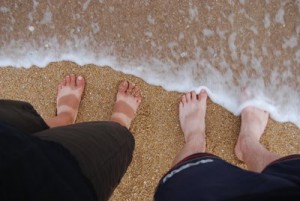On our long bus ride to Ghana, Jason and I started reading a book that has started us reflecting on how we want to live differently when we get back to Canada. It talks about making choices based on values: choosing contentment over consumerism, stop and play over fast forward, talking over technology, so on and so forth. It seems especially relevant because the values it promotes are modeled for us here in the cultural nuances of Burkina. One choice in particular relates to the issue of time.
Jason and I recall the state in which we left Canada: hurried, harried, to-do lists, late nights, overworked and overtired, trying to get ourselves on that plane to come here. We had spent more time in a state of motion versus a state of rest. We had established a pattern of choices based on our value of productivity over process. Somehow this very notion was working itself into the way we were viewing relationships too. In fact, we have struggled with the notion of taking a Sabbath for awhile now.
It strikes us here in Burkina how un-hurried life seems to be. It is more about relationship and process than efficiency and product. Sure, inefficiencies in many areas of this culture are, to be blunt, irritating. And maybe the lack of development actually doesn’t give anyone a choice in the matter really. But, we can’t help but notice how much more it feels like acommunity here, when process and relationships are more important than productivity. For example: what does everyone do in the evenings? They sit outside and visit. The streets at night are humming with everyone out in their shops visiting with friends, sitting around, just being WITH other people. What about at midday? We take a 2-2.5 hour break from work for rest and relaxation. Sure, maybe people do this as a matter of necessity because it’s so hot…but even so, when do we do that in Canada? It takes a torn ligament for me to take that kind of rest!
Other examples: one of our friends here invited us over for dinner. While there, the rest of his family was still awake, but were just sitting outside in their compound, in the dark- just being with one another. In all of life’s circumstances this restful, relaxed and unhurried characteristic of the culture is evident. Even when a bus stops unexpectedly, making us now 5 instead of 4 hours late, and everyone has to sit on the side of the road in the hot sun, no one is irate about the loss of time. No one is yelling and screaming, shaking their heads. People just sit there and well, seem to handle this whole notion of being stillquite well.
Everything takes time here and for that, in so many ways, I am thankful. It’s a daily reminder that most things shouldn’t be and can’t be rushed (like making leavened bread or learning languages).
One quote in particular cuts straight to the heart of the matter:
“We’ve [our culture] sanctified a rushed pace as having a sort of inherent virtue, as if going someplace fast is naturally good. But the question lost in our almost panic driven pursuit is this: just where are we trying to get? It’s as if where we are going becomes insignificant. What’s important is that we just go, go, go. And so, lemming-like, that’s what we do. In a world of fast-forward, we desperately need to hit “pause” and “play.” There are some things which cannot be rushed: time with God, time with family, time with friends, time with ourselves.”
God help us recognize taking short cuts is not always better. God help us rejoice in processes and relationships for the characteristics they produce in us. God remind us that some of the best things are etched with time.

2 responses to “From Lemmings to Leaven : lessons on time”
i love this post; i find that we are wrestling with the same types of issues here in cambodia. what is the name of the book you are reading?
Thanks for your ideas. I live with a cloud of guilt over me because I alosmt never write to my child. I just don’t know what to say. Also, he is too little to write so his mom writes to me. I don’t know if I am supposed to write to her or him. Anyway your blog has encouraged me start writing. Thank you.